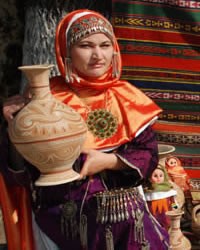Lak in Azerbaijan

Photo Source:
The Action - Wikimedia
Creative Commons
|
Send Joshua Project a map of this people group.
|
| People Name: | Lak |
| Country: | Azerbaijan |
| 10/40 Window: | Yes |
| Population: | 1,800 |
| World Population: | 188,700 |
| Primary Language: | Lak |
| Primary Religion: | Islam |
| Christian Adherents: | 0.80 % |
| Evangelicals: | 0.80 % |
| Scripture: | Portions |
| Ministry Resources: | Yes |
| Jesus Film: | Yes |
| Audio Recordings: | No |
| People Cluster: | Caucasus |
| Affinity Bloc: | Eurasian Peoples |
| Progress Level: |
|
Introduction / History
The Lak people of southwestern Russia's Dagestan region have been semi nomadic sheep herders for hundreds of years. Their lives took a turn for the worse when in 1944, Stalin's military forced them to move to a windswept plain and start life all over, far away from their mountainous homeland.
After 1957 the Akkin were allowed to return to their villages. But most of their villages and farmlands were now resettled for nearly 15 years by the transplanted Lak clans. What to do? Some moved to their original mountain village region in south central Dagestan and rebuilt abandoned villages. Others remained or resettled to a new lowland region in northeastern Dagestan near the Caspian Sea, north of the capital city of Makhachkala. All of these upheavals have 'stretched' the Lak, not only geographically but also emotionally and relationally.
Most still live in Russia's Dagestan or the urban center of Makhachkala, the capital of Dagestan. There are smaller Lak populations in former Soviet nations such as Azerbaijan, Kazakhstan, Tajikistan, Turkmenistan, and Uzbekistan.
What Are Their Lives Like?
We know very little about how the Lak people live outside of their homeland. Most likely they continue to be involved with agriculture. Others make their living by producing and selling textiles and leather good such as shoes.
Their family structure is patriarchal, meaning the line of descent is from the father's side. A patriarch, either the father or grandfather, holds much power in a Lak family. They live in extended families. Family leaders arrange marriages.
What Are Their Beliefs?
The Lak were one of the first of all Dagestani peoples to convert to Islam in the 8th Century, and for many centuries their mountain central town of Kumukh was a center of Islamic learning. Now in this era the Lak hold a position of respect for many Dagestanis, partly due to their ancient leadership and also now due to their unifying influence as they have stretched into many sectors of Dagestan. Starting in the 1990s a significant number of urban Lak came to faith in Jesus—there are now more than 50 Lak believers, mostly in urban sectors of Dagestan.
What Are Their Needs?
The New Testament books of Mark and Luke were completed in Lak, but then Bible work stalled due to no team leadership available. Thankfully, in 2010 a young Russian linguist, with his family, moved to Dagestan and restarted Lak linguistic work. They hope to finish the Lak New Testament.
Lak history is majestic, and yet tragic, and often the deficit of loving grace is palpably felt.
Prayer Points
Pray for men and women of peace (Luke 10:6) in each Lak location to be keys to welcoming the love of God, the grace of Jesus, and the power of the Holy Spirit.
Pray boldly that the Lak people, with their complicated relational dynamics and position of honor in Dagestani society, will be used by the Lord to bring grace to many other Muslims in Dagestan and Central Asia.
Pray for encouragement and success for the Lak Bible translation team.
Pray that the Lak people—in the midst of their many upheavals—will be drawn to the Father of mercies and God of all comfort in the love of Christ.
Pray for the Lak believers to shine as bright lights in the midst of their Lak families and clans.